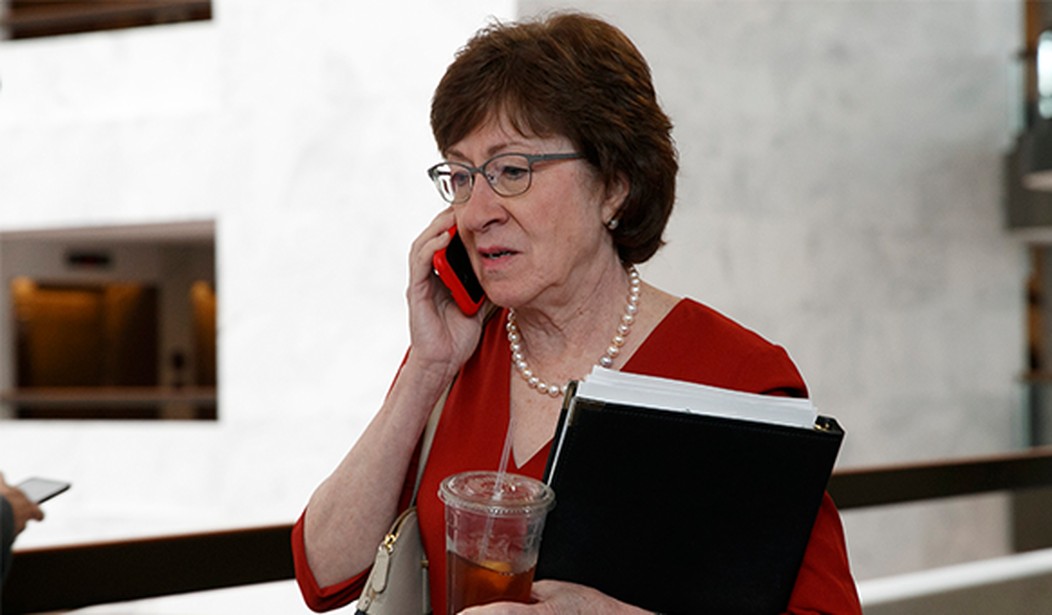On Sunday's edition of CNN's "State of the Union," many topics were discussed between host Jake Tapper and Sen. Susan Collins (R-ME). What's particularly grabbing headlines, though, is the senator's comments about Speaker Nancy Pelosi's select committee for January 6.
“I do not think it was right for the Speaker to decide which Republicans should be on the committee,” says GOP Sen. Susan Collins on House Speaker Nancy Pelosi’s decision to reject two of House Minority Leader Kevin McCarthy’s picks for the Jan. 6 select committee. #CNNSOTU pic.twitter.com/qNS4N2Ep2C
— State of the Union (@CNNSotu) August 1, 2021
Tapper asked if Collins "do you have faith in" what he referred to as "this bipartisan committee," stressing that Reps. Liz Cheney (R-WY) and Adam Kinzinger (R-IL) were on the committee. When Tapper tried to push back against her referring to the committee as "Speaker Pelosi's partisan committee that she has set up" Collins explained her reasoning:
S. COLLINS: ...I fought very hard to have an independent, bipartisan, nonpartisan, outside commission to look at all of the events of that day. And I'm very disappointed that it was not approved. I think it would have had far more credibility than Speaker Pelosi's partisan committee that she has set up.
But we should have had a 9/11-style convention to fully look at what happened.
TAPPER: Yes, I mean, Mitch McConnell opposed it, and that's why it didn't happen.
I should -- you called it a partisan committee. I should note that there are two Republicans on the committee, Cheney and Kinzinger. Do you have faith in them?
S. COLLINS: I respect both of them, but I do not think it was right for the speaker to decide which Republicans should be on the committee.
Normally, if you have a select committee, the minority leader and the speaker get to pick the members.
TAPPER: Yes, I mean, just a -- the reason she did that is because at least two of the members McCarthy picked to be on the committee are election liars, one of whom, Jim Jordan, is possibly even a material witness. He spoke with Trump that day.
Recommended
House Minority Leader Kevin McCarthy (R-CA) was afforded five picks for the select committee, though Speaker Pelosi had veto power. McCarthy ultimately pulled all of his picks after the speaker objected to Reps. Jim Banks (R-IN) and Jim Jordan (R-OH).
Last Sunday, Pelosi announced she was adding Rep. Kinzinger to the committee. She had already announced days before that she was adding Rep. Cheney.
While on "Fox News Sunday" last week, Rep. Banks stuck to a message that in denying members such as himself and Jordan a spot on the committee, Pelosi is only allowing her narrative to be presented and is avoiding the "tough questions." He also speculated that Pelosi "doesn't want us to ask these questions because at the end of the day she is ultimately responsible for the breakdown of security at the Capitol that happened on January 6th."
House Republicans have stuck to that unifying message since. Polling from Morning Consult also suggests that this tactic is in line with what the Republican base wants. A majority of Republicans now oppose the committee, and a majority want to focus on other topics, as they agree "there has been too much focus on the January 6th events at the U.S. Capitol."
It's worth reminding that Collins isn't exactly part of the MAGA crowd. She's considered a moderate, even a RINO by some. As she herself told Tapper, she voted to convict Trump in his second impeachment trial, when he was already out of office by that point.
Collins also voted in favor of having a special commission to investigate January 6. Such a bill passed the House with bipartisan support but ultimately failed in the Senate with a vote of 54-35 after Republicans filibustered.

























Join the conversation as a VIP Member